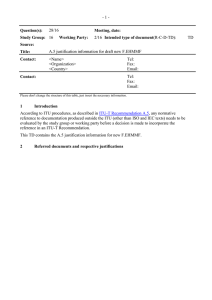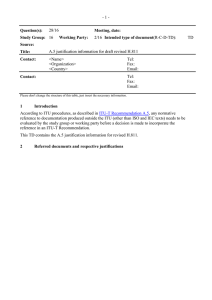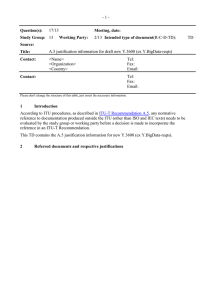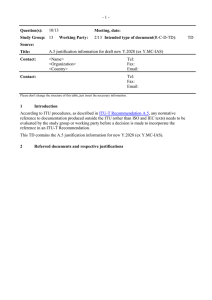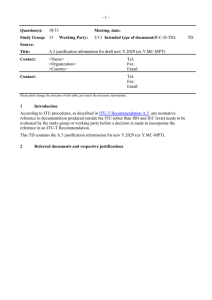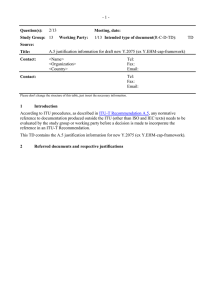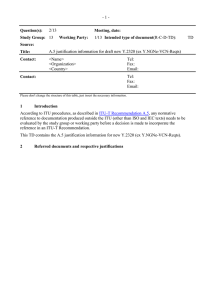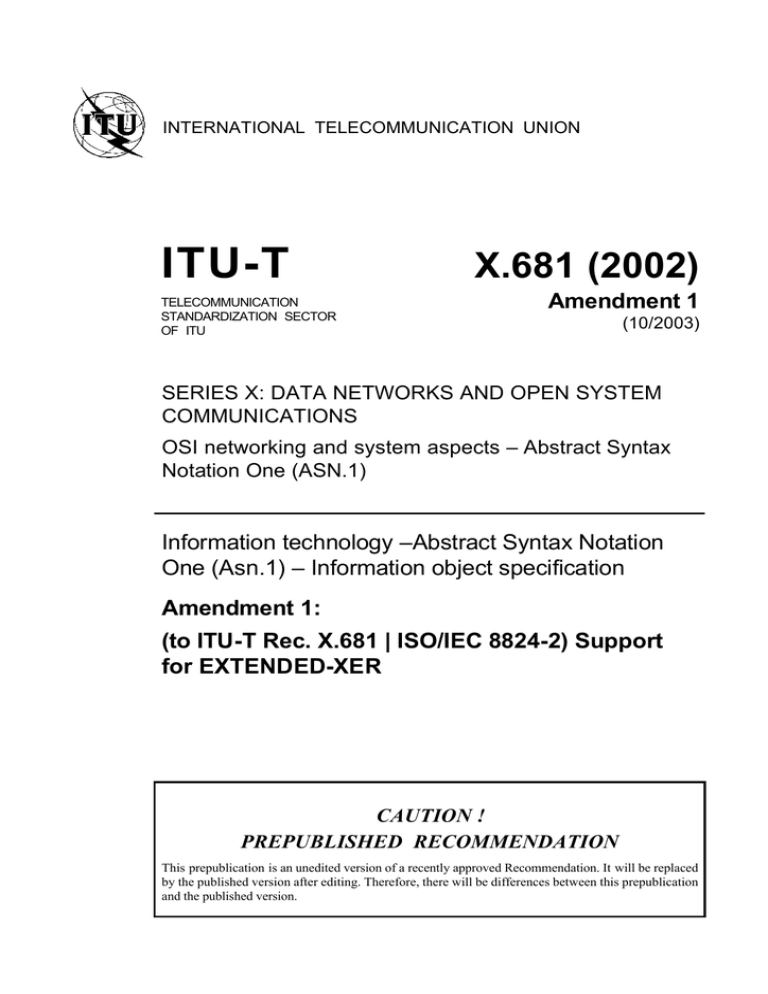
INTERNATIONAL TELECOMMUNICATION UNION
ITU-T
TELECOMMUNICATION
STANDARDIZATION SECTOR
OF ITU
X.681 (2002)
Amendment 1
(10/2003)
SERIES X: DATA NETWORKS AND OPEN SYSTEM
COMMUNICATIONS
OSI networking and system aspects – Abstract Syntax
Notation One (ASN.1)
Information technology –Abstract Syntax Notation
One (Asn.1) – Information object specification
Amendment 1:
(to ITU-T Rec. X.681 | ISO/IEC 8824-2) Support
for EXTENDED-XER
CAUTION !
PREPUBLISHED RECOMMENDATION
This prepublication is an unedited version of a recently approved Recommendation. It will be replaced
by the published version after editing. Therefore, there will be differences between this prepublication
and the published version.
FOREWORD
The International Telecommunication Union (ITU) is the United Nations specialized agency in the field of telecommunications. The ITU Telecommunication Standardization Sector (ITU-T) is a permanent organ of ITU.
ITU-T is responsible for studying technical, operating and tariff questions and issuing Recommendations on
them with a view to standardizing telecommunications on a worldwide basis.
The World Telecommunication Standardization Assembly (WTSA), which meets every four years, establishes
the topics for study by the ITU-T study groups which, in turn, produce Recommendations on these topics.
The approval of ITU-T Recommendations is covered by the procedure laid down in WTSA Resolution 1.
In some areas of information technology which fall within ITU-T's purview, the necessary standards are
prepared on a collaborative basis with ISO and IEC.
NOTE
In this Recommendation, the expression "Administration" is used for conciseness to indicate both a
telecommunication administration and a recognized operating agency.
Compliance with this Recommendation is voluntary. However, the Recommendation may contain certain
mandatory provisions (to ensure e.g. interoperability or applicability) and compliance with the Recommendation
is achieved when all of these mandatory provisions are met. The words "shall" or some other obligatory
language such as "must" and the negative equivalents are used to express requirements. The use of such words
does not suggest that compliance with the Recommendation is required of any party.
INTELLECTUAL PROPERTY RIGHTS
ITU draws attention to the possibility that the practice or implementation of this Recommendation may involve
the use of a claimed Intellectual Property Right. ITU takes no position concerning the evidence, validity or
applicability of claimed Intellectual Property Rights, whether asserted by ITU members or others outside of the
Recommendation development process.
As of the date of approval of this Recommendation, ITU [had/had not] received notice of intellectual property,
protected by patents, which may be required to implement this Recommendation. However, implementors are
cautioned that this may not represent the latest information and are therefore strongly urged to consult the TSB
patent database.
ITU 2003
All rights reserved. No part of this publication may be reproduced, by any means whatsoever, without the prior
written permission of ITU.
INFORMATION TECHNOLOGY –
ABSTRACT SYNTAX NOTATION ONE (ASN.1) –
INFORMATION OBJECT SPECIFICATION
DRAFT AMENDMENT 1
(to ITU-T Rec. X.681 | ISO/IEC 8824-2)
Support for EXTENDED-XER
1
Summary
An Amendment 1 is provided for ITU-T Rec. X.680 | ISO/IEC 8824-1, ITU-T Rec. X.681 | ISO/IEC 8824-2, ITU-T
Rec. X.690 | ISO/IEC 8825-1, ITU-T Rec. X.691 | ISO/IEC 8825-2 and ITU-T Rec. X.693 | ISO/IEC 8825-4. These
amendments provide the following:
–
Correction of a bug in CXER resulting from allowing white-space between a minus sign and a following
INTEGER or REAL value (CXER was not canonical). This is no longer permitted, in value notation, XML
Value Notation or in XER and CXER. This is a change and not an addition.
–
Addition of encoding instructions in an ASN.1 module, using either a type prefix or within an encoding
control section, in order to specify variations of the BASIC-XER encodings. These encoding instructions
are designed to support mappings from an XSD specification to an ASN.1 specification. This provision has
meant a change of terminology, where a type with "[…]" in front of it is a prefixed type, and the "[…]"
notation may or may not be a tag. This change of terminology results in changes to the text (but not the
substance) of the BER and PER specifications.
–
The addition of NaN (Not-a-Number) and minus zero as new values for REAL (support for encoding these
new values is provided in Amendment 1 to ITU-T Rec. X.690 | ISO/IEC 8825-1 and to ITU-T Rec. X.691 |
ISO/IEC 8825-2, as well as in Amendment 1 to ITU-T Rec. X.693 | ISO/IEC 8825-4).
–
The addition of new XML Value Notations for REAL, BOOLEAN, ENUMERATED, and INTEGER that use text
rather than empty-element tags for the values. These are available in XML Value Notation and in
EXTENDED-XER, but not in BASIC-XER (for reasons of backwards-compatibility).
–
Changes to the XML Value Notation for sequence-of (and the XER encodings) to provide delimitation of
values where they are not XML elements (this occurs with the additional XML Value Notations, and only
affects use of those additional XML Value Notations). This change is only concerned with use of XML
Value Notations that have been added by this amendment, and these are not allowed in BASIC-XER, which is
not affected.
This provides the necessary basic support for EXTENDED-XER.
ITU-T Rec. X.681 (2002)/Amd.1 (10/2003) – Prepublished version
1
INFORMATION TECHNOLOGY –
ABSTRACT SYNTAX NOTATION ONE (ASN.1) –
INFORMATION OBJECT SPECIFICATION
DRAFT AMENDMENT 1
(to ITU-T Rec. X.681 | ISO/IEC 8824-2)
Support for EXTENDED-XER
NOTE: All new or changed text in this document is highlighted in yellow in clauses being replaced. When
merging all such text into the base document the highlighting is to be removed.
In subclause 14.6, replace the production "XMLOpenTypeFieldValue" with the following:
XMLOpenTypeFieldVal ::=
XMLTypedValue
|
xmlhstring
Replace subclause 14.9 with the following three subclauses:
14.9
For a type field or a variable-type value or value set field defined by an "ObjectClassFieldType", the
"XMLOpenTypeFieldVal" shall be used in any "XMLValue".
14.9.1 When used in an ASN.1 module, the type identified by the "XMLTypedValue" shall be any ASN.1 type (but
see ITU-T Rec. X.680 | ISO/IEC 8824-1, 13.3) and the "XMLValue" in the "XMLTypedValue" shall be any value of that
type.
NOTE – When the notation is used as specified in ITU-T Rec. X.693 | ISO/IEC 8825-4, 8.5, the type of the "XMLTypedValue" in
an "XMLOpenTypeFieldVal" is identified by the protocol (for example, by a component relation constraint), the
"NonParameterizedTypeName" in the "XMLTypedValue" is derived from this, and the "XMLValue" is a value of this type.
14.9.2 The "xmlhstring" alternative of "XMLOpenTypeFieldVal" shall not be used in an ASN.1 module. This
alternative can be used only as specified in ITU-T Rec. X.693 | ISO/IEC 8825-4, 8.5, when the type is identified by the
protocol and the "xmlhstring" is the hexadecimal value for the encoding of that type, using some (unspecified)
encoding rules.
Replace subclause 14.12 with the following:
14.12 For an "XMLOpenTypeFieldVal", if the "Type" specified in the information object (after ignoring any tags) is a
"typereference" or an "ExternalTypeReference", then the "NonParameterizedTypeName" shall be that "typereference"
or "ExternalTypeReference", otherwise it shall be the "xmlasn1typename" specified in ITU-T Rec. X.680 | ISO/IEC
8824-1, Table 4 corresponding to the built-in type specified in the information object, after application of the
subclauses of ITU-T Rec. X.680 | ISO/IEC 8824-1, 25.11, if applicable.
Replace subclause 15.6 with the following:
15.6
For a "TypeFromObject" and a "ValueSetFromObjects", the XML value notation for sequence-of and set-of
(see ITU-T Rec. X.680 | ISO/IEC 8824-1, Table 5) and the "xmlasn1typename" (if required) shall be determined by the
"Type" specified in the information object(s), after application of the sub-clauses of ITU-T Rec. X.680 | ISO/IEC
8824-1, 25.11, if applicable.
In Annex F, replace the production "XMLOpenTypeFieldValue" with the following:
XMLOpenTypeFieldVal ::=
XMLTypedValue
|
xmlhstring
_____________________
ITU-T Rec. X.681 (2002)/Amd.1 (10/2003) – Prepublished version
2

